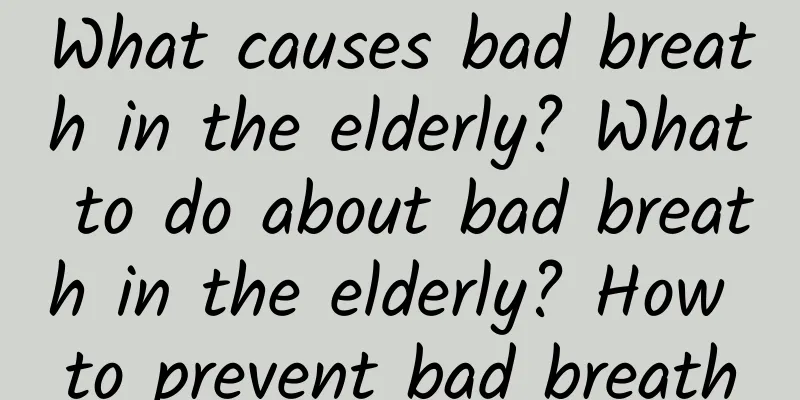What causes bad breath in the elderly? What to do about bad breath in the elderly? How to prevent bad breath

|
It is embarrassing to have some bad breath in the mouth when there are many people around. The main problem is bad breath. You dare not get close to other people. Not only you are embarrassed, but others will also feel embarrassed. There are many reasons for bad breath. Now many elderly people may have bad breath. You can find the cause and treat it symptomatically. How to relieve bad breath? Next, let's take a look at the relevant knowledge about bad breath in the elderly with the Knowledge Center. 1. Causes of bad breath in the elderly(1) Periodontal disease A common reason for halitosis in the elderly is periodontal disease, especially chronic periodontal disease, which forms blind pockets and produces chronic pus discharge and odor. In this case, periodontal disease should be treated to eliminate blind pockets in order to eliminate halitosis. Periodontal disease, periodontal pus discharge, oral ulcers, caries, food impaction, etc. also often cause halitosis. (2) Acute inflammationThe elderly will also have bad breath when they suffer from acute inflammation. There are some acute inflammatory secretions in the mouth, which will cause bad breath. If these diseases are cured, the bad breath will disappear after the inflammation subsides. Maxillary sinusitis, atrophic rhinitis, nasal polyps, hypertrophic rhinitis, pharyngitis, tonsillitis, etc. can also cause bad breath. (3) Food residueWhen eating, food residues are left in the teeth. Because the periodontal tissue of the elderly shrinks physiologically, gaps are formed between the teeth, which makes it easy for food debris to stay in the gaps between the teeth after eating, and produce bad smells after fermentation by bacteria in the mouth. The thicker food residues on the tongue coating may also remain in the folds of the tongue surface, causing bad breath. (4) Saliva secretionAfter middle age, saliva secretion gradually decreases, the self-cleaning function of the oral cavity is reduced, and coupled with the invasion of diseases, middle-aged and elderly people are more likely to have bad breath. (5) Digestive diseasesThe elderly have reduced digestive function and often suffer from indigestion or gastrointestinal reflux disease, which can cause the smell of food retained in the stomach to be exhaled from the mouth, which is also an important cause of bad breath. As long as the digestive tract disease is cured, the bad breath will be eliminated. (6) Drug effectsAs the body functions decline with age, the elderly often suffer from various diseases. They often have to take various medications. Some medications often reduce the amount of water in the body, causing dry mouth and bad breath. (7) Dentures with bracesMany elderly people wear braces and dentures, and it is easy for food residue to remain inside them, and the decayed matter may also cause bad breath. If dentures are not cleaned regularly or not removed during sleep, they are prone to bad breath. In addition, diabetic ketoacidosis can produce "apple-flavored" bad breath. Patients with chronic renal insufficiency or uremia have ammonia and urine-like bad breath. Gastrointestinal dysfunction and bleeding in various gastrointestinal segments can also cause bad breath. Elderly people who suffer from chronic diseases and are bedridden for a long time lack oral exercises, which causes dry mouth and is prone to bad breath. Some elderly people who love smoking not only exhale unpleasant odors, but also reduce saliva secretion, exacerbating bad breath. 2. What to do if the elderly have bad breath(1) Drink plenty of water The elderly are prone to dry mouth and bad breath due to the decline of internal circulation. At this time, the elderly should drink more water to keep the mouth moist to prevent dry mouth and bad breath. (2) Chew slowlyFor the elderly, chewing their food slowly can not only promote the digestion and absorption of food by the stomach and intestines, but also help accelerate the secretion of saliva in the mouth, which is very helpful in preventing bad breath. (3) Maintain oral hygieneExperts suggest that when the elderly rinse their mouths, they should try to rinse the deepest part of the mouth and the brushing time should be more than 2 minutes; the elderly who use mouthwash should hold the mouthwash for about 30 seconds. If conditions permit, the elderly should also wash their teeth once every 2 to 3 years. (4) Cleaning denturesMany elderly people need to wear dentures due to tooth loss. At this time, they need to pay attention to the cleaning of the dentures. They need to clean the food residue on the dentures after each meal and soak the dentures in water every night to prevent bad breath as much as possible. (5) Eat more fruits, etc.If the cause of bad breath is dry mouth, the elderly can eat oranges or drink juice, because the citric acid in oranges can promote saliva secretion. Chew more coriander, kumquat, hawthorn, etc. to remove the taste in the mouth. Eat more fruits and vegetables, probiotic preparations, etc. 3. How to prevent bad breath in the elderly1. If there are caries, residual crowns or residual roots in the mouth, food debris will adhere to these lesions. After the bacteria in the mouth act, the food residue will ferment and produce bad breath. As long as the caries, residual crowns or residual roots are treated, the bad breath will disappear. 2. There is periodontal disease in the mouth, especially chronic periodontal disease, which forms blind pockets, produces chronic pus discharge and emits a foul odor. At this time, the periodontal disease should be treated and the blind pockets should be eliminated to eliminate bad breath. 3. Acute inflammation occurs in the oral cavity, such as acute periodontal abscess, pericoronitis of the third molar, etc. There are some acute inflammatory secretions in the mouth, which can also cause bad breath. If these diseases are cured, the bad breath will disappear after the inflammation subsides. 4. The periodontal tissue of the elderly will physiologically shrink, and gaps will form between the teeth. After eating, food debris will stay in the gaps between the teeth, and produce bad smells after being fermented by bacteria in the mouth. Therefore, you should pay attention to oral hygiene, brush your teeth in the morning and evening (before going to bed), rinse your mouth after meals, and remove food residues in the mouth to prevent bad breath. 5. Digestive tract diseases. Elderly people have reduced digestive function and often suffer from indigestion or gastrointestinal reflux disease. They can exhale the odor produced by food retained in the stomach from the mouth, which is also an important cause of bad breath. As long as the digestive tract disease is cured, the bad breath will be eliminated. 4. Massage methods to relieve bad breathExperts say that Daling acupoint is the earth-transmitting acupoint of the pericardium meridian and is a sub-acupoint of the meridian. According to the principle of "draining the sub-acupoint of the meridian" in traditional Chinese medicine, Daling can clear and drain the heart fire; in addition, the pericardium meridian also "traverses the three burners", and Daling acupoint is of earth nature. Daling acupoint can also drain the heat of the spleen and stomach, and treat bad breath caused by the fire of the heart and spleen. In clinical practice, it is often used in combination with Shuigou acupoint (Ren Zhong acupoint) for better results. As the "Yulong Song" says: "Bad breath is the most hateful disease, and the labor of the mind is only due to the bitterness of the sentimentality. Daling acupoint drains Ren Zhong, and the heart feels cool and calm." Clinically, Daling acupoint can also treat cramps and pain in the arms and hands. Because Daling acupoint is located in the depression between the two tendons behind the palm, its course is consistent with the palmaris longus tendon and the deep and superficial flexor muscles (tendons) of the forearm. Traditional Chinese medicine believes that the meridian tendons are formed by their unique "gathering and dispersing collaterals" distribution, running through the limbs and body, and forming the muscle system in the meridian system. The meridian tendons are also divided into hardness and softness, and yin and yang. The soft meridian belongs to yin and is mostly distributed on the inner side of the limbs. The hard tendons are strong and powerful, while the soft tendons are slender and soft. Under normal circumstances, the combination of hardness and softness maintains the antagonistic flexion and extension movement of the human body. If the yin and yang, hardness and soft tendons are out of balance, "yin is urgent and cannot bend and stretch". Stimulating Daling acupoint can dredge the heart qi, so that the heart yang can warm the body, the body's yin and yang, qi and blood can be nourished, and the tendons and bones can be nourished, thereby restoring the body's normal motor function and curing cramps and pain. ■ Acupuncture point selection method Daling point is located at the junction of the palm and arm. When the wrist is bent, horizontal lines will appear on the wrist. The midpoint of the second complete horizontal line, between the two tendons, is this point. ■ How to operate First, press the Daling acupoint on the right hand with the tip of the left thumb, apply vertical force, press downward, press and rub it, then flex and extend the right wrist joint to allow the stimulation to fully reach the deep layer of the muscle tissue, produce soreness, numbness, swelling, pain, heat and wandering, etc. The intensity should be within the patient's tolerance. After 20 to 30 seconds, gradually relax, and then gently rub the local area, and repeat this operation. Alternate between the left and right hands, press each side of the acupoint for 5 to 10 minutes each time, 1 to 2 times a day. ■ Notes 1. Eat less irritating foods such as garlic, onion, tobacco and alcohol. 2. Eat more vegetables and fruits to protect your gums. Eat more crude fiber foods and drink more water to prevent constipation. 3. You can drink a proper amount of tea at ordinary times, which can not only clear away heat and reduce internal heat, but also clean the mouth and improve the symptoms of bad breath. Bad breath in the elderly is also closely related to digestion. The digestive system of the elderly is in a degenerative stage, so they should eat some easily digestible food. Many elderly people may not pay so much attention to hygiene, which is of course not good. It is best to brush your teeth every morning and evening, and rinse your mouth after eating food with a strong odor. If you have any oral problems, it is best to go to the hospital for timely treatment. |
<<: When is the best time to drink yogurt? The nutritional value, efficacy and function of yogurt
Recommend
Understand from one picture: What are the chances of going from "Yang Kang" to "Wang Chongyang"?
Recently, the number of COVID-19 positive tests i...
Reasons for heavy menstrual flow after abortion
Everyone knows that abortion is a very harmful me...
How long after hemorrhoid surgery can women have sex?
"If women need surgery for hemorrhoids, the ...
What happens when you stay up late during your period?
Many people know that they should pay attention t...
Can I eat rambutan during menstruation?
We all know that for women, menstruation is a ver...
What are the hazards of minimally invasive surgery for cervical erosion?
The treatment of cervical erosion mainly relies o...
I have abdominal pain after sitting for a long time.
If you do it for a long time and experience bloat...
There are three reasons for the sudden drop in progesterone
The level of progesterone in women after pregnanc...
Although air conditioning can "extend life", if this step is missing, it is really easy to get sick!
The summer is hot and humid. After being outdoors...
Snappli: Survey shows only 4% of iOS 6 users are using Apple Maps
September 29, 2012, according to foreign media re...
Which is better, Yasmin or Mafulong?
There are many emergency contraceptives on the ma...
How to treat dysmenorrhea in women
Dysmenorrhea is one of the most common gynecologi...
4 bad habits that can easily lead women to contract gynecological diseases
Washing machine to clean underwear and cause infl...
What if there are worms in the stool?
When we were very young, most of us have taken an...
How long after sex can I use a pregnancy test stick
Generally speaking, women who do not wish to beco...









